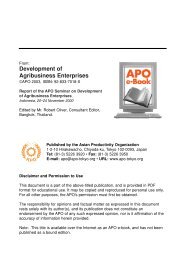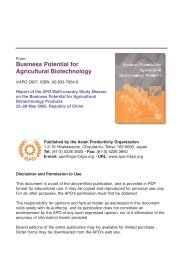Annual Report 2009 - Asian Productivity Organization
Annual Report 2009 - Asian Productivity Organization
Annual Report 2009 - Asian Productivity Organization
You also want an ePaper? Increase the reach of your titles
YUMPU automatically turns print PDFs into web optimized ePapers that Google loves.
Company, Lanka Balloons, and Country Style Foods<br />
Lanka, all in Colombo, Sri Lanka.<br />
Institutional Strengthening of National <strong>Productivity</strong><br />
<strong>Organization</strong>s through the Development of <strong>Productivity</strong><br />
Practitioners<br />
Subsequent to the DON Need Assessment Survey<br />
completed in January 2008, the DON Program was<br />
undertaken at two levels: DON Strategy and DON<br />
Implementation. DON Strategy identifies new and<br />
emerging topics, issues, and challenges of APO<br />
member countries. DON Implementation is to build<br />
the capacity of NPOs following the results of DON<br />
Strategy. The new approach aims to align APO<br />
services closer to individual member countries’ longterm<br />
development strategies and direction. In pursuit<br />
of this approach, the Secretariat introduced in-country<br />
training programs for developing a pool of productivity<br />
practitioners and training technical staff of NPOs in<br />
<strong>2009</strong>. NPOs participated in this initiative by involving<br />
their professional staff in the intensive tailor-made<br />
in-country productivity and quality training offered<br />
through this program.<br />
Group exercise for teamwork improvement, Cambodia<br />
In <strong>2009</strong>, six in-country training programs were organized<br />
in association with the participating NPOs to<br />
provide productivity and quality practitioners with<br />
firsthand exposure to the tools and techniques of<br />
productivity improvement, thereby enabling NPOs to<br />
build a critical mass of practitioners in their countries.<br />
These included training programs in Fiji, 25 May–6<br />
June, with 35 participants; Indonesia, 22 June–4<br />
July, with 20 participants; Cambodia, 10–22 August,<br />
with 28 participants; Thailand in two phases, 12–16<br />
October and 30 November–4 December, with 35<br />
participants; Bangladesh, 24 October–5 November,<br />
with 26 participants; and Lao PDR, 9–21 November,<br />
with 23 participants. Each program was followed by a<br />
comprehensive examination, and in most site visits to<br />
industries were organized for practical insight.<br />
Development of <strong>Productivity</strong> Practitioners: Basic<br />
Program<br />
The training courses on the Development of <strong>Productivity</strong><br />
Practitioners: Basic and Advanced (DPP:<br />
Basic and Advanced) were launched by the APO in<br />
response to the urgent needs of NPOs. The entire<br />
course was reviewed and its contents improved and<br />
standardized by the APO in 2008. DPP: Basic aims to<br />
equip participants with basic, fundamental knowledge<br />
of productivity so that they can perform the roles of<br />
junior productivity practitioners. They must be able<br />
to diagnose the current productivity performance in<br />
any organization and then adopt and implement the<br />
appropriate solution for improvement. To provide<br />
sufficient time for field practice and in-depth study on<br />
productivity tools and techniques, the course duration<br />
for DPP: Basic was extended from three to four<br />
weeks.<br />
In collaboration with the DAP, the APO conducted<br />
the 14th DPP: Basic from 6–31 July, which was attended<br />
by 20 participants from 14 member countries.<br />
At the end of this entry-level course, participants were<br />
expected to be able to identify, use, and explain basic<br />
productivity approaches and tools; adopt an integrated<br />
productivity framework for diagnosing productivity<br />
problems and developing and implementing solutions;<br />
and provide training, consulting, and promotional<br />
services to NPO clients. The APO deputed two<br />
international resource persons, and the DAP invited a<br />
pool of local resource persons comprised of in-house<br />
and external trainers.<br />
Program coverage: <strong>Productivity</strong> concepts and implementation<br />
strategy; <strong>Productivity</strong> tools and techniques;<br />
<strong>Productivity</strong> practitioner development; and Developing<br />
individual productivity and quality action plans.<br />
Four companies hosted the participants for inplant<br />
diagnosis and suggestions for improvement:<br />
Bahay Pastulan, a producer of local food items; Lean<br />
Processes Inc., a cosmetic toll packer; College of<br />
Economic, Management, and Development Studies,<br />
Cavite State University; and Lamoiyan Corporation, a<br />
toothpaste producer.<br />
Development of <strong>Productivity</strong> Practitioners: Advanced<br />
Program<br />
The training courses on the Development of <strong>Productivity</strong><br />
Practitioners (DPP): Basic and Advanced have<br />
been conducted since 1994 and 2001, respectively.<br />
These two courses equip productivity professionals<br />
from NPOs with basic and advanced productivity and<br />
quality tools to strengthen the institutional capacity<br />
of NPOs. With rapid developments in national and<br />
global markets, which demand higher-quality products<br />
and services, there is a continuous need for NPOs to<br />
have personnel who can deliver training effectively<br />
APO ANNUAL REPORT <strong>2009</strong> 39<br />
INTERFACE SECTOR
















